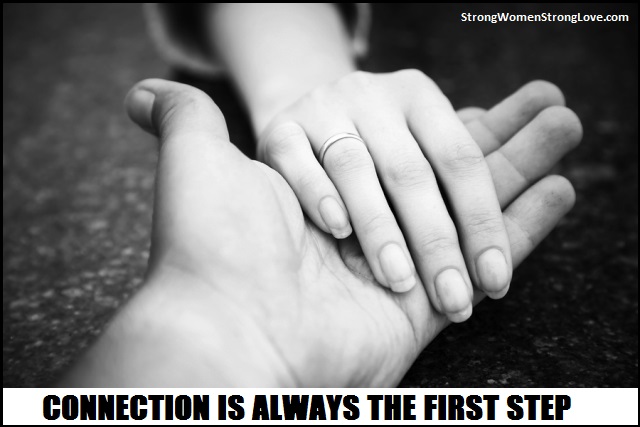by Strong Women Strong Love | Mar 16, 2017 | Passionate Partnership |

You know that look in his eyes or that certain touch. He’s feeling amorous. But you’re just not in the mood for sex. Everyone feels like saying no to sex sometimes. But it’s important to do it in a way that respects your partner’s feelings and that maintains the overall health of your relationship.
Some Myths About Sex and Marriage
It might ease your mind to know that there are some common misperceptions about sex and marriage. The big one is that there’s some “magic number” — the amount of sex you’re supposed to be having. That’s not just true. The number of times you have sex in any week, month or year isn’t important. What is important? That both of you are satisfied with the amount of sex you are having. Frequency of sex varies a lot among happy couples.
We also tend to have a very limited definition of what sexuality can be in a relationship. If you aren’t doing “the deed,” it doesn’t mean that your marriage isn’t sexual. A sexual connection is about more than intercourse. It can also mean holding hands, feeling an emotional bond, making loving contact or sending sexy texts. At times in a marriage where intercourse naturally wanes — such as after the birth of a child — it’s good to have this expanded vocabulary of sexual acts to draw on to keep your bond strong.
Be Honest about the Underlying Cause
Sexuality is an important part of your marriage. If your desire is misaligned with your husband’s, start by looking for possible causes.
There could be a physical reason you’re just not in the mood for sex lately. Health issues, medications, hormonal changes, aging … they can all put a damper on your libido. Consider getting a checkup if you suspect a physical cause for your lack of sexual desire.
Your lack of desire might also have an emotional component. You might be bringing some other issues into the bedroom. If, say, you’re super-resentful that he doesn’t do more around the house, it’s hard to feel too frisky. It’s important to deal directly with the problem that’s dampening your desire.
Or you could just be plain exhausted by the frantic pace of our lives today, so you stop having sex as often. Unfortunately, the less frequently you have sex, the less likely you are to want it (use it or lose it). If your sex life has fizzled out because you’re busy and tired, try scheduling some time to get intimate when you’re not so worn out. This doesn’t sound very romantic, but it actually works.
If You Do Need to Say No to Sex
When you do turn your husband down, communicate what’s going on with you. For example, “I’m exhausted after these past two days at work” or “I just can’t stop thinking about my mom’s illness right now.” He needs to know that he’s not the reason you’re not in the mood for sex. It’s also helpful to suggest another time the two of you can possibly connect sexually.
Taking a pass on sex will feel a lot less charged if your husband isn’t the only one who ever initiates it. If he’s always the one who has to risk rejection, he could just stop asking. Make the first move sometimes.
Consider Saying ‘Yes’
Sometimes you really, really are not in the mood for sex. When it’s just not happening for you, don’t hesitate to say no. But sometimes your mood might be more “eh” than “no.” Or maybe you know that you tend to get more into things once sex gets started. If that’s the case, consider giving him the thumbs-up. But this should not become the pattern in your relationship.
For more advice like this, check out my book Strong Women, Strong Love. I wrote it to help busy couples enhance both physical and emotional intimacy.
by Strong Women Strong Love | Feb 28, 2017 | Parenthood, Poisonous Patterns |

It’s a crossroads that countless couples have encountered: Their marriage has become unhappy and unsatisfying. But they fear hurting their children by divorcing.
Should you stay in your marriage for the kids, or end it? Both choices are painful. Which one is better?
Each couple has to ultimately decide what’s right for them and their family. But I do believe there’s a wise way couples can approach this life-altering decision.
A caveat before I go on: This advice is for people in unhappy marriages, not relationships that are marked by abuse and aggression. If you’re in a situation like this, please seek professional help.
Have You Given Your Marriage a Real Chance?
For most unhappy couples, the decision about ending a marriage when kids are involved isn’t so clear-cut. You may long for an escape from your marriage, but you also know the stakes are high for both you and your children. A divorce can complicate all your lives for years. And no matter what you decide, you and your husband will still have to co-parent.
Because divorce is a serious decision, it’s not one that you should rush into. Especially since some studies have shown that a good percentage of people who divorce end up regretting their decision.
That’s why my advice to most couples on the brink is to make sure that they’ve done everything they can to save their marriage before calling it quits.
Using the Research on Marriage to Help You
If you’re intent on working on your marriage, there’s very good news. Research has given us clear insight about what makes marriages succeed or fail. If you are determined to give your relationship a chance, you can be smart and focused in your approach. If you’re both willing to put in the work — reading books, getting therapy, going to marriage workshops — you have a better chance than ever of salvaging your relationship.
Have you educated yourself about what makes a marriage work? Do you know about the four horsemen and the best predictor of divorce? If you don’t know what I’m talking about, then you have some work to do.
As a parent, if you do divorce, you want to be able to honestly tell your kids that you did everything you could to try to make the marriage work.
Sadly, not every marriage can be rescued. If that’s the case for you and your husband, you’ll at least have the peace of knowing you were thoughtful in making the decision to divorce, and that it is really the better option for you. You’ll move forward with fewer “what ifs” and regrets. And the efforts you put in should help the two of you with your post-divorce relationship as co-parents to your kids.
If you are looking for ways to work on your marriage, I want to point you toward my book Strong Women, Strong Love. I wrote it to help busy couples nurture their marriage amid their stressed and demanding lives. If you’re ready to seek couples therapy, seek recommendations from people you trust, consult your insurer’s director of providers or browse Psychology Today‘s listing of therapists in your area.
by Strong Women Strong Love | Feb 16, 2017 | Poisonous Patterns |

You have a great friend at the office. You enjoy working with him and sometimes you even grab lunch together. He’s funny, considerate and easy to talk to. So easy to talk to, in fact, that you find yourself sharing things with him that you don’t share with your husband.
You’re in dangerous territory.
Emotional infidelity can be a stepping stone to a full-blown affair. And even if it doesn’t turn into one, it can still damage your marriage.
When Does a Friendship Cross the Line into an Emotional Affair?
It’s fine, of course, to have friends outside your marriage, but it’s important to know the difference between a friendship and an emotional affair.
One of the first signs you might be engaging in emotional infidelity is that you’re talking with your friend about things you don’t discuss with your husband. The following questions can also help you determine whether you might be crossing the line. Ask yourself:
- Would you talk with your friend about the same things if your husband were present?
- If your husband doesn’t know your friend, would you feel comfortable introducing them? If not, why not?
- Can you honestly say that you don’t have any feelings other than friendship for this person?
- Are the two of you communicating secretly, either on the phone or in person? Why?
Worried that you might be drifting into an emotional affair? You can take a quiz on the website of Dr. Shirley Glass, an expert on the topic, to see if your friendship has become an emotional affair : Just Friends or Emotional Affair Quiz.
The Cost of Emotional Infidelity
One common reason that people commit emotional infidelity is because they feel an emotional disconnection from their spouse. Addressing that sense of loneliness or estrangement is hard work. It can seem easier to avoid issues between you and your husband and distract yourself with attention from someone outside your marriage — all the while rationalizing that it “doesn’t count” because it’s not physical.
But it does count. An emotional affair can be a slippery slope to a physical affair. But even if the relationship never becomes physical, it still harms your marriage because of the secrecy and betrayal that is often involved.
People who find out about their spouse’s emotional affair may feel just as devastated as those who find out their partner is having a physical affair. In fact, some would even argue that emotional betrayal is worse than physical infidelity. Sometimes it can hurt more to find out your spouse is physically present, but deeply emotionally connected to someone else.
Putting the Brakes on an Emotional Affair
Lots of aspects of our lives today make us vulnerable to emotional affairs. Working long hours can lead to more closeness with your “work husband” than your real husband. And Facebook puts old flames at our fingertips.
If you are having an emotional affair, consider it a signal that you need to put your marriage front and center again. Ask yourself what’s driving you to look outside of your relationship to get your needs met, and see if you can address that problem directly. If it’s that you don’t feel good about yourself, get some counseling and work on yourself. If you’ve become resentful of your husband and feel distant from him, work on your marriage.
You can find more advice on the factors that lead to infidelity in my book Strong Women, Strong Love. Don’t wait to address this critical issue in your marriage.
by Strong Women Strong Love | Feb 2, 2017 | Passionate Partnership |

With Valentine’s Day near, it’s a good time to talk about the work of The 5 Love Languages by author Dr. Gary Chapman.
Chapman’s book has sold millions of copies, and with good reason. His 5 Love Languages framework is a helpful way of understanding how you and your spouse express and feel love. The idea is that once you know which Love Language each of you speaks, you will be more effective at making each other feel loved.
Let’s take a quick look at each of Chapman’s Love Languages.
1. Words of Affirmation
If this is your Love Language, it’s extra-important to you to hear your partner say that you are loved and appreciated. Really, though, who couldn’t use a few more kind words and compliments? Remembering to express appreciation or to praise each other builds up goodwill in your marriage. Your words of affirmation don’t have to be elaborate or flowery. The important thing is to share them when they come to you. Of course, if this is the Love Language for either of you, be more deliberate about expressing loving compliments or bragging about your spouse to others.
2. Acts of Service
Some people show their love by doing things for the people they care about. Traditional husbands often speak this Love Language, but their message may be missed if their spouse speaks a different Love Language. For instance, your husband may be doing things for you, but you may not feel loved until he compliments you or gives you gifts. Of course, this can go the other way too. You may be the one who is always bending over backward to take care of your husband and end up feeling unloved if he does not help you around the house without being asked.
3. Receiving Gifts
There is a strong emphasis on giving gifts in our society, and days like Valentine’s Day often place tremendous pressure on husbands to find the right gift. If this is your Love Language and you have your hopes set on a particular gift, be sure to speak up. It’s much more effective to be direct with your husband about what you want instead of dropping hints or assuming he should “just know” what you like. Remember, he wants to make you happy, so he’s not likely to get his feelings hurt if you point him toward the gifts that make you feel treasured. Your directness will spare you unnecessary disappointment.
4. Quality Time
So how are you supposed to speak this Love Language when both of you are crazy-busy? One way is by offering undivided attention when you can. Even something as simple as acknowledging each other with a warm hello when you get home goes a long way. That being said, if this is the primary Love Language for either one of you, you must make spending regular quality time together a high priority.
5. Physical Touch
Humans need loving touch. It helps us feel safe with each other. Some people need more touch than others, so if that’s the case with you or your spouse, look for ways to be physically expressive with your love. Perhaps add a kiss and a hug to that post-work greeting or hold hands when you’re sitting on the couch. Remember, though, that touch isn’t always synonymous with sex. It’s not uncommon for parents to go through sex droughts because of a lack of time or privacy, but expressing physical affection can keep the fires burning till you can get back in the groove.
Talking with your husband about your respective Love Languages can open up new intimacy in your marriage. Take an online quiz and discover which Love Languages the two of you speak! Apply what you learn, and see how it draws the two of you closer.
by Strong Women Strong Love | Jan 15, 2017 | Persistent Pressures, Personal Power |

You might have seen this humorous bit of wisdom in your social media feeds:
Almost everything will work again if you unplug it for a few minutes. Including you. – Anne Lamott
There’s a lot to be said for those wise words. Give yourself breaks from the technology that seems to overtake our lives sometimes. It’s one of the healthiest things you can do for yourself and for your relationships.
Doing vs. Being
We live in a culture of busyness. Nothing demonstrates that more than our connection to our devices. We always seem to be scanning for new emails, texts and social media posts – a constant stream of information and things to do.
Living this way, though, makes it difficult to thrive.
Our brains function in two modes. The first one is doing. When we’re in doing mode, we’re focused on our goals, or we’re thinking about something that’s already happened. We’re either planning the future or reflecting on the past in some way.
The other mode is being. In being mode, we’re fully present and engaged with what’s right in front of us. Perhaps that’s feeling invigorated by a morning run or having a pleasant, intimate moment with your spouse.
The Problem with being Stuck
The technology we’re surrounded by these days makes it easy to get stuck in doing mode. The brain loves new information and it’s now possible to have a constant stream of it, day or night. It can be extremely difficult to unplug from this constant stimulation.
However, one of the inevitable problems when we spend too much time in doing mode is becoming emotionally off balance. Our brains need stimulation, but also rest and restoration.
Imagine your brain is like a snow globe. Too much doing leaves your brain feeling like the snow globe has been shaken up. It’s difficult to see clearly what’s going on in your life. You’ll make worse decisions, be emotionally more reactive, and be much harder to connect with.
We need to spend time in being mode to bring our brains back into balance. But a lot of us have the tendency to just keep pushing harder and harder, doing one thing after another. And our ever-present technology makes that even easier. Times we might have been forced to take a break in the past (for example, commuting or standing in line) we now fill with even more doing.
This just isn’t a sustainable way to live.
Shift Modes
We have to fight our tendency to think that things will be better if we can just do more. In fact, the opposite is true. If your life is feeling out of whack right now, I’m willing to bet it’s not because of the things you need to do. Instead, you’re probably craving more time just to be.
Make a list of things that pull you into the state of feeling present and engaged. Some common activities that can get us back into being mode are listening to music, exercising or moving in other ways, praying, meditating or deep breathing. Art, engaging a loved hobby, or being in nature can also help bring us into the present.
But if the thought of adding one more activity (even beneficial ones like these) to your day makes your head spin, you can turn anything you already do into one that mentally restores you. When you’re eating, put down your phone, pull yourself into the present, and actually taste your food. When you’re walking from your car to your office, refrain from checking your email, take a deep breath, and just notice the world around you.
Experiment some with unplugging this week. As you spend more time in being mode, you should feel emotionally steadier and less stressed. And you’ll probably also notice that you’re more present for the important people in your life.
by Strong Women Strong Love | Jan 2, 2017 | Personal Power, Principal Priorities |

Is this the marriage you wanted? I know that’s a blunt question. But take a moment to be really honest with yourself.
If your relationship isn’t what you want it to be, what are you doing about it?
Because there are things you can do.
It’s easy to buy into the common idea that if your partner were your true soul mate, he would instinctively fill all of your needs. That simple expectation can set your relationship up for trouble by putting you into a passive role in your marriage.
The reality is that you have some ability to shape your marriage. As I’ve said before, there is no neutral in a relationship. You’re either building up your marriage or tearing it down. Take an active role in your relationship to help it grow into one that meets your needs.
Even if your marriage does feel perfect right now, don’t assume it doesn’t need daily maintenance. Marriages can change for the better or for the worse depending on your everyday actions.
Here are just a few ideas for actively getting — or keeping — your marriage on track. You can find many more in my book Strong Women, Strong Love.
- Take care of yourself first. If you’re trying to work on your relationship while you feel personally depleted, you’re not going to get too far. When you’re perpetually tired and stressed, you lose some key relationship skills, like patience and being a good listener. Take a few extra self-care steps this week, whether that means catching some extra sleep or making time for things that bring you joy. You’ll feel better and your relationship will benefit.
- Make marriage maintenance a daily habit. You don’t need a whole different life (you know, one with more time, money or distance from your in-laws) to have a better marriage. Instead, remember that you can improve your relationship just by being a little more mindful in moments you share every day. Put away your phones when you talk. Remember to say thank-you. Add more affectionate touch. And make sure conflict always stays in the respectful zone.
- Create a marriage-friendly lifestyle. You’re probably juggling lots of different priorities — and all of them feel urgent. Your relationship can get lost in the shuffle. Take a look at how you spend your time. Are there activities or obligations you can let go of in order to devote more time to you marriage and other things that really matter?
Your marriage is always a work in progress. What small steps can you take this week to move it closer to where you want it to be?
by Strong Women Strong Love | Dec 14, 2016 | Personal Power, Principal Priorities |

Are you looking for a New Year’s resolution? I have a powerful one for you.
All it involves is saying a single two-letter word. It’s simple, but it’s not easy. At least not at first. Here it is:
Say NO. A lot.
The very idea of making “no” a bigger part of your vocabulary might unsettle you. I’ve seen that many women tend to feel very uncomfortable around this one little word. For some of us, saying no feels almost like an act of aggression.
Here’s the thing, though. None of us — no matter how capable and generous we are — can say yes all the time. Every time you say yes to one thing, you’re saying no to something else at the same time. Yes and no are like flip sides of the same coin.
So you have to get very deliberate. What are the important things in your life that you always want to say yes to? Maybe it’s having weekends free for your family, or enough time for the yoga classes that make your body and spirit strong. When you know what your yeses are, it gets easier to say no to other things.
It’s wise to start small when you’re learning to say no. You don’t have to leap right into a face-to-face announcement to your mom that you’re not spending Christmas Day at her house like you usually do. Pick a request that’s a little less emotionally loaded first — like turning down a telemarketer that wants just a few minutes of your time to make a pitch (“Thank you so much, but I’m not interested. Goodbye.”) And give yourself permission to take the easy way out. Say no by text. Or just don’t speak up first at a meeting when volunteers are being recruited.
Even then, you might feel guilty about saying no.This doesn’t mean you’re a bad person. Sometimes guilt is helpful, but sometimes it’s just a sign that part of you is uncomfortable and resisting change.If you can, just keep taking small steps, and you will find this kind of guilt tends to dissolve over time.
Saying no more frequently eventually opens up a sense of freedom. You can free yourself from time-wasting, meaningless activities, and use your time to do what you love with the people you love. You can free up space to take better care of yourself, whether that means sleeping and exercising more or delving back into a long-neglected hobby.
“No” might not feel natural for you at first. But it’s an essential word to master. So what will you say no to in 2017?
by Strong Women Strong Love | Dec 1, 2016 | Personal Power |

I’ll be upfront with you: One of the best gifts you can give yourself and your husband this time of year is being direct.
Kind directness keeps the lines of communication open in your marriage. It keeps resentments from taking root. It helps make sure you’re both operating from the same set of expectations.
Yet being direct is hard for many women. Why is that? Why are we so uncomfortable asking for what we need or telling others what’s going on with us?
A lot of it has to do with how women have been raised in our culture. You may have been taught to anticipate everyone else’s needs — your husband’s, your kids’, your boss’s. And I bet you’re very good at it. You probably know the subtle signs that your husband is ready to leave a party, or that your daughter could use some extra encouragement before her semester exams.
Because we’re so adept at reading others and knowing what they need, I think we feel a little disappointed when we have to come out and say the things that we think others, especially our husbands, should have figured out on their own. I’ve heard a version of this sentiment from women many times: “I don’t want to have to tell him. He should just know.” It’s as if getting what they want has less value if their husbands don’t intuit it.
Some of us have also been taught that it’s somehow rude to communicate directly. Maybe, for example, you’ve gone on at length about how busy you are at work in hopes that your husband will offer to take on more gift shopping or holiday travel prep. Dropping hints might work with other people who are fluent in indirect communication. But it may just go right over your husband’s head.
Wouldn’t it be easier just to ask? Most husbands relish the chance to make their wives happy. And they’d appreciate more information on how to do that. He doesn’t care about you any less just because you have to come right out and tell him the gifts you’d like or that you’d rather stay home more this holiday season instead of traveling. In fact, he’d be thrilled to know.
This holiday season, look for opportunities to be more direct. See how it feels and how others react. If you’re still a little uncomfortable, that’s OK. You’re learning something new. Keep practicing. It really does get easier.
by Strong Women Strong Love | Nov 16, 2016 | Persistent Pressures, Personal Power |

This time of year, you’ll see plenty of articles about how to have the happiest holiday season ever. You’ll find no shortage of advice on how to deck your halls, craft handmade gifts, start beloved traditions and dazzle at parties.
That’s all well and good, but I want to make things much simpler for you. Today I’m going to share with you one tip that could make this the least stressful holiday season you’ve ever had. It’s free. It doesn’t require crafting or cooking skills. It works no matter which holidays you observe. And it doesn’t have an expiration date. In fact, I hope you use it well after the last New Year’s celebrations have wrapped up.
What’s my magical tip?
When people get on your nerves, assume that they’re not doing it on purpose.
Trust me, you’ll have plenty of opportunities to try out this mental shift in the coming weeks. What if you stopped assuming things like this?
- Your husband leaves all gift shopping to you because he doesn’t value your time.
- Your friend posts pictures of her perfect decorations and gift-wrapping to make others feel inferior.
- Your brother is always late to gatherings because he’s trying to tick you off.
- Your mom only picks at the holiday meals you prepare because your cooking isn’t fancy enough for her.
The truth is, we’re all pretty self-involved. We don’t think very much about the ramifications our actions have on others. Unless a person has shown you before that he’s malicious (in which case you’ve got a whole other issue going on), it’s more likely that he just doesn’t know how he’s affecting you.
When you assume someone is being clueless instead of downright nasty, the whole situation suddenly feels a great deal lighter. You let go of resentments and start seeing constructive solutions.
Getting Past Assumptions
Since this blog focuses on how to strengthen your marriage, I would especially encourage you to stop assuming your husband has bad intentions when he does something that disappoints or irritates you.
The holiday season can be a time of high expectations, so it’s prime time for assuming the worst!
Let’s go back to an example from above:
Your husband leaves all gift shopping to you.
You’ve been assuming you know the reason for this behavior. You’re absolutely certain that it’s because he doesn’t value your time, so he’s intentionally passing the gift shopping off to you.
But what else could be behind his behavior?
- Maybe he thinks you love gift shopping.
- Maybe he believes you think he’s terrible at choosing gifts.
- Maybe his own mom did the shopping for their family and he just assumes that’s how all families do it.
- Maybe he doesn’t realize how long it takes and that it affects your schedule that much.
It’s also possible he really doesn’t value your time, but it’s important to be sure that’s the case before you work off that negative assumption.
Sometimes it’s easier to start by assuming your husband isn’t doing anything to you on purpose and just letting him know how his actions affect you. That could sound like:
With both our families growing, we’re gift shopping for more people now. Taking care of it all is leaving me pretty stressed. You’d be helping me a lot if we could start dividing up the gift list.
As an experiment this week, pay attention when your husband or anyone else pushes your buttons. Notice whether you automatically assume the worst about their behavior. If you do, try replacing that assumption with the belief that the other person isn’t trying to hurt you. How does that make you feel? Let me know how this mental shift works for you during the holiday season and beyond.
by Strong Women Strong Love | Nov 1, 2016 | Passionate Partnership, Persistent Pressures |

I’m a big fan of psychiatrist Daniel Siegel. You may remember a past blog post where I shared some of Siegel’s advice about what to do when you “flip your lid.”
Today, I want to talk about another strategy from Siegel. You may have heard of his Connect and Redirect method in the context of parenting. But the ideas behind it can strengthen your marriage (or any other relationship, for that matter).
The key thing to remember about Connect and Redirect is that any interaction will be more fruitful and satisfying if you take a moment to establish emotional connection before launching into what you need.
In our marriages, though, we often forget this step. Because we’re all so busy, it seems easier just to “cut to the chase.” We also tend to take those we’re closest to for granted and be much more abrupt and less tactful with them than we are with other people.
But taking that extra moment to build connection pays off. It helps your spouse get into the mental space where he can truly hear what you’re saying and engage with you.
Make Connection a Habit
Establishing connection doesn’t take long and it’s not complicated. Loving touch and positive eye contact go a long way. So does acknowledging what’s going on with your husband before you bring up the topic you want to discuss. You don’t have to reserve this communication technique for big, important discussions. It’s just as handy when you’re dealing with the routine concerns of family life.
Compare these two interactions:
- Your husband arrives home clearly still stressed from work or his commute. You shout from the kitchen, “The cable’s out again – what are we going to do about this?”
- Your husband arrives home looking stressed. You greet him with a quick hug and kiss and ask what’s up. He says traffic was much heavier than usual during his drive home. “Ugh! Frustrating!” you commiserate. “When you’ve had a chance to unwind a little, I want to talk to you about maybe changing cable providers.”
In the second interaction, you’re letting your husband know that he’s cared for and that he doesn’t have to put his defenses up. You’re making it easier for the two of you to work together for a solution to the cable issue.
As I said earlier, sometimes we have to be deliberate in giving our spouses the same consideration we automatically show our friends. If you know this area is a trouble spot for you, you may want to remind yourself to frame things with your husband the same way you would if you were talking with a friend. If, for example, you needed to reschedule your weekend trip with a friend, you’d probably take a minute to check in on her life and see if it’s a good time to talk before you told her about the change in plans. But you might be tempted to skip those “niceties” with your husband.
Remember, though, that we all need reminders that the people we care about care about us in return. When we get them, we show up more fully and give more generously. The time you invest in nurturing that feeling of connection is well worth it.











